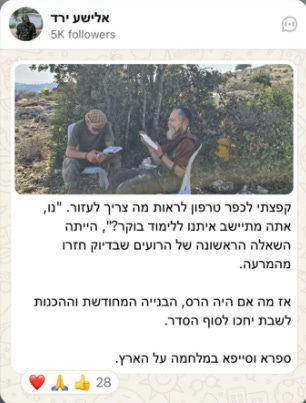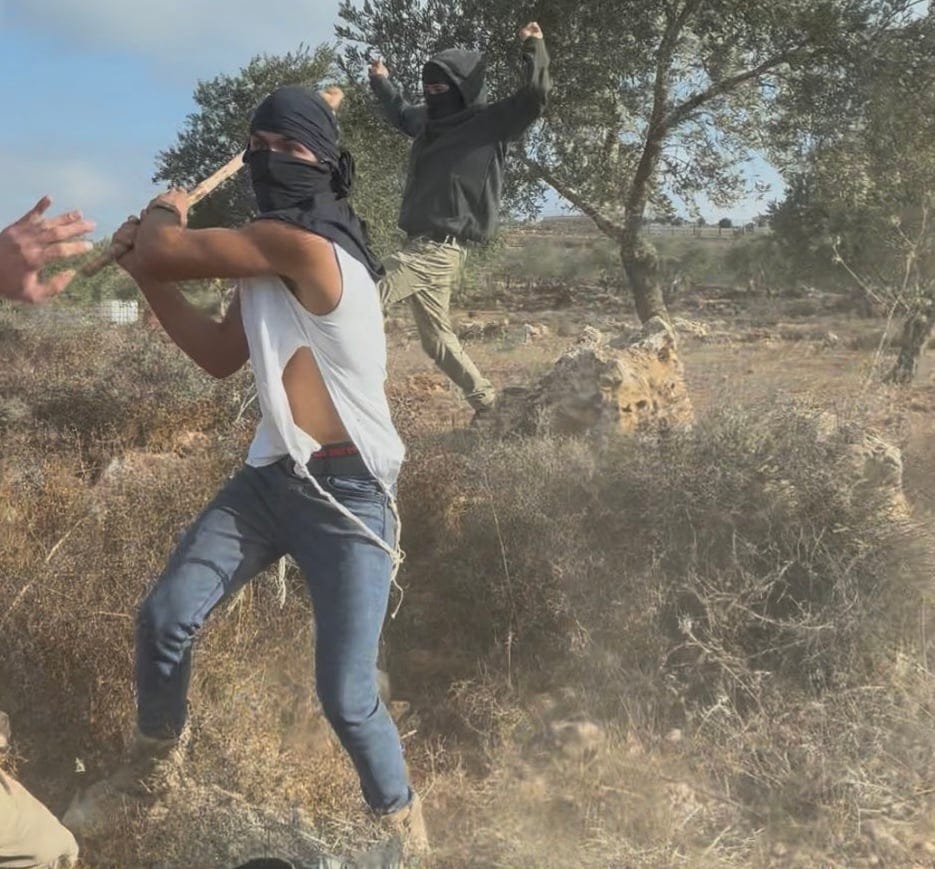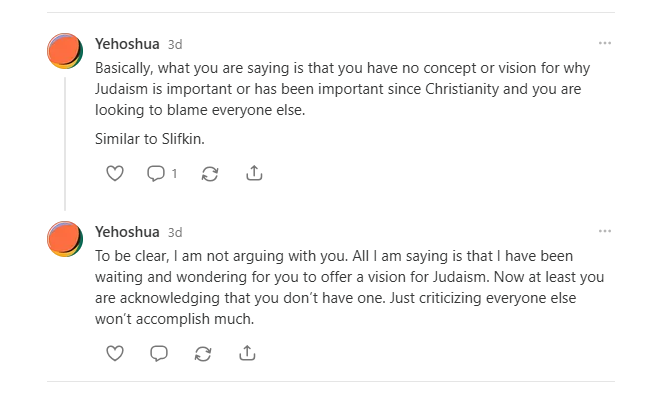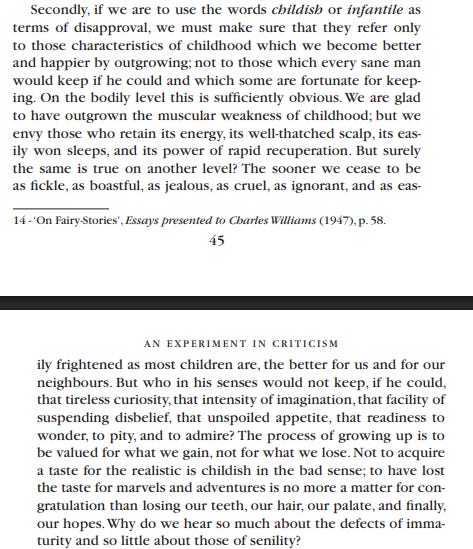Nitpicking among the ruins
Pedantry won't save us, but we'll have to make do
I keep putting off writing a series of posts I have vaguely planned out critiquing Religious Zionism. On the one hand, it’s a big task that requires a lot of breadth and depth, but on the other hand, it seems so easy as to be demeaning to actually engage in it. It’s like writing a polemic against Irritable Bowel Syndrome: ‘Our first objection, and, to my mind, the most pressing, is the mess’. However, while I’m gearing myself up, I had a sperging incident yesterday evening that I think is quite illustrative (and not just of the fact that I am a sperg). First a photo:
Elisha Yered is a Breslev terrorist from the Binyamin region implicated in at least one killing. He is pretty active and has benefitted from Katz’ decision last November to decriminalise Jewish violence in the Occupied Territories and so is feeling pretty cock-a-hoop these days. For the goyim and noobs who don’t read Hebrew, he is recounting how he went to visit the shepherds of Kfar Tarfon, another Binyamin outpost, to lend a hand, and was touched to find that they would not discuss mundane matters until they had finished their morning learning. 🤗.
Anyway, our focus today is the last line ספרא וסייפא במלחמה על הארץ, which I will translate for now, following what I think is authorial intent, as ‘the book and the sword in the war for the land’. The reference is to a familiar idea in Religious Zionism that their task is to revive an earlier, biblical model of Jewish life, blending Jewish observance and scholarship with serving as warriors, combining what was unfortunately kept asunder in the schism between Zionists and the Orthodox.
So far, so good, but why does it say ספרא וסייפא in Aramaic? Why not הספר והסייף or, less pretentiously, הספר והחרב1? Well, as the authors of the Zohar can attest, if you write in Aramaic you can get away with writing any old nonsense. Though Aramaic is objectively a much more clumsy and clunky language than Hebrew (sorry), its liminal status between familiarity and unfamiliarity gives it a certain cachet, somewhere in between using bits of Latin and Shakespearian English in contemporary American speech. However, you can’t just throw Aramaic words in randomly because people won’t understand and you’ll just look like a weirdo. It has to be a known phrase, usually involving a literary allusion. So what’s the literary allusion? SPERG ALERT INCOMING.
If you google ספרא וסייפא you get ספרא וסיפא ירדו כרוכים מהשמים, which, while, rather alarmingly, being cited by Ohr Torah Stone, the Ministry of Education, and various beyond cringe Zionist accounts, doesn’t exist. Its origin seems to be an Israeli newspaper headline from 1949 mixing some things up. The real text appears in the following versions:
Sifrei Devarim
רבי אלעזר המודעי אומר, ספר וסייף ירדו כרוכים מן השמים אמר להם אם עשיתם את התורה הכתובה בזה הרי אתם ניצולים מזה ואם לאו הרי אתם לוקים בו. היכן פירושו של דבר ויגרש את האדם וישכן מקדם לגן עדן את הכרובים ואת להט החרב המתהפכת לשמור את דרך עץ החיים סליק פיסקא
Devarim Rabah
אמר רבי אלעזר, הסיף והספר, ירדו כרוכים מן השמים, אמר להן אם תעשו מה שכתוב בספר הזה אתם נצולים מן הסיף הזה, ואם לא תעשו, אתם נהרגים בסיף הזה.
Vayikra Rabah
תני בשם רבי אלעזר הסיף והספר נתנו מכרכין מן השמים, אמר להם הקדוש ברוך הוא אם שמרתם מה שכתוב בספר זה הרי אתם נצולים מן הסיף, ואם לאו סוף שהוא הורג אתכם
The import in all three cases is that a sword and a scroll (of the Torah) descended, tied up one with the other, from heaven and Israel was given the choice: either they would observe what was in the scroll, or they would be punished by the sword. Here ספר and סייף are considered, if anything, as antitheses, and, in any case, it’s all in Hebrew, so this can’t be what we’re looking for.
In fact, there’s only one place in Rabbinic literature where ספרא and סייפא are paired together, B. Avodah Zarah 17b, but the allusion is so staggeringly inappropriate that at first you can’t quite believe it’s intended:
אתיוה לרבי אלעזר בן פרטא, אמרו: מאי טעמא תנית, ומאי טעמא גנבת אמר להו אי סייפא לא ספרא ואי ספרא לא סייפא ומדהא ליתה הא נמי ליתה. ומאי טעמא קרו לך רבי רבן של תרסיים אני
Rabi Elazar ben Parta, who lived through the intense persecutions of the Bar Kokhba era, was brought to stand trial for two crimes, being the teacher of Torah (ספרא, meaning not book, but scribe, learned man), and being a bandit (סייפא, one who wields the sword). He responds that the charges are mutually inconsistent, he can be one or the other, but not both אי סייפא לא ספרא ואי ספרא לא סייפא, and thus both allegations are clearly malicious falsehoods. You can read the rest of the story yourself, but he gets off.
So, we’ve found the origin of the phrase ספרא וסייפא and the obvious questions is can Religious Zionists really be so confused that they use a catchphrase which is two things the talmud explicitly says you can’t be at the same time? I smelled some weird Kookean-Sabbatean ‘break the Torah to fulfil it’ thing, but I couldn’t track it down. The earliest reference I found was in the commentary of Rabbi Asher Wassertil זצ”ל who wasn’t a Kookist at all and had a very credible Rabbinic background. He refers to the famous traditional motif of Zebulun as a tribe devoted to Torah study supported by his brother Yissachar, points out that there are other more historically plausible explanations that describe him as a tribe of warriors, and mentions that nowadays it is common to see ‘yeshiva graduates who are sometimes armed … הספרא והסייפא’ apparently oblivious to the incongruousness of the allusion (not to mention using redundant definite articles). However, he seems to just be using a phrase that was already common in Hebrew to mean scholar-soldier, so this in an example of Religious Zionists being lame by just adopting Zionist culture and putting a kippah on it rather than being antinomian.
And that’s where the trail goes cold; I can’t figure out which Zionist was the first to re-coin this phrase and what exactly his angle was.2 However, this is all just a preliminary to an essay I found by Rav Moshe Avigdor Amiel זצ”ל. Rav Amiel was the Chief Rabbi of Antwerp and then Tel Aviv. Like Rav Kook, he was a great visionary thinker, boldly reinterpreting classic rabbinic texts for the needs of the age without undue regard for philology or context. However, unlike Rav Kook, his writings are free from translated Hegel and weird antinomian kabbalah, and are much more accessible to people educated in the normal range of Torah sources. His major theme was that Judaism in exile was a mutilated religion unable to fulfil its true mission, degenerating into obsessions with trivialities. He articulated a quasi-Hirschian conception of Orthodox Judaism as teacher of ethical monotheism to the nations, but justifying the precise opposite of the Hirschian view of Zionism. Judaism was, in his view, superior to other religions not by virtue of being the purest religion, but by virtue of not being a religion at all. Judaism is, rather, a nation, and a nation requires a land and state.
Anyway, the essay from 1936, הסייף והספר, is for Parshat Zachor, when we read about Amalek, so, you’re probably thinking Uh-Oh, but you’d be quite wrong. Indeed, you might at first think this can’t be real. Here are the main parts of the essay, the translation is my own. I’m not going to drive myself nuts over it so if you see what appears to be a mistake let me know:
Even at a surface reading, we perceive that Amalek is a symbol of militarism, for whom the sword serves not only as a means, but as the purpose of life. Or, to be more precise, that this is the whole content of his life, and those that go out to war do not do so out of necessity or because there is no choice, but as one goes out to dance, because only here, in war, do they find the ability to define and express their selves and their nature…
The global custom, among the civilized nations, even though amongst them too the evil inclination dominates internally, nevertheless, for reasons of etiquette, they send, before they go out to war, warnings to the opposing side - ‘ultimatum’ in English - that if they do not fulfil specified demands, then the sword will determine. Amalek, however, does not thus conduct himself: he does not require pauses or preparations; he does not know of prior warnings or declarations, for of what purpose to him is all the bother? All of these international laws are just a scrap of paper, to which such a mighty one as he pays no heed…
…
Even though none of the regimes are genuinely righteous, nevertheless there is a limit and boundary to their lust for war. They ‘fight until noon’,3 that is to say [they cease] while they have still yet to realise all of their territorial aspirations, and they do not fall upon nations with whom they have no dealings by dint of proximity. But the kingdom of Amalek fights ‘from morning till evening’, both with those whom they have a natural conflict of interest and those with whom they have nothing to do…
…
The fundamental reason for his wars is that he ‘does not fear God’.4 Indeed, Amalek loves God, for he is always saying ‘beloved God’ - Der liebe Gott in German, But this is precisely the problem, that he loves God but does not fear Him. And, indeed, not for nothing does he love Him, for he has a god that permits him to do what his heart desires. Everything is permitted and fitting for him. In short, a god that they do not need to fear and the fact that he ‘does not fear God’ is the cause of the love of God, so to speak, that he possesses.
By contrast, amongst us, the commandment to love God appears only in Deuteronomy, after the commandment of ‘you shall fear God’ has already been rooted. Amalek puts Deuteronomy (the repetition of the Torah) before the Torah itself, and he begins straight away with the love of God, and concludes with murder and all the abominations of the world, and all in the name of Der liebe Gott …
Certainly, the Lord may He be blessed, does not love war ever. To the contrary, Peace is His name. Thus one war has He made an obligatory war, the war against the war of Amalek, the war against war in toto.
‘A war of the Lord with Amalek from generation to generation’.5 Amalekiteism hates the weak and the Jews hate the mighty; Amalekitenism seeks the persecutors, and the God of Israel seeks the persecuted6…
…
There is an eternal war between the sword and the book, and the one cannot be built up except on the ruins of the other, and as one prevails the other falls, and therefore there is an eternal war between Israel and Amalek.
And with what means do we fight with Amalekitism and with all masters of the sword according to their kinds? How and by what means does Israel intend to bring about the end of militarism in the world? Behold, in our days and before our eyes, we saw also an ‘obligatory war’ of this sort, a World War, which also had the motto ‘a war against militarism’, and are not the results of this war well known to us all?
Rather, the approach of Judaism is that the ‘prosecutor cannot become an advocate’.7 We cannot uproot evil from the world by means of evil itself. We cannot remove terror from the world by means of terror from the other side. Therefore, we do not fight against a strong hand by means of a strong hand, and we do not fight the sword by means of the sword.
When Judaism declare war against militarism, it did not do so by means of militarism, but rather by means of ‘And the Lord said to Moshe, “write this as a memorial in the book”’, that is to say, against the sword by means of the book.
…
Indeed it important for us to know that there are no shortcuts in nature nor shortcuts in character formation. If we want to reach the level of love of God, we must begins with the level of fear of God. He who begins with the fear of God has hope that slowly he will reach the level of love of God, but he who begins with love specifically will never achieve even fear.
Similarly, he who wishes to acquire the characteristic of mercy must first acquire the characteristic of justice. If he wishes to start first with mercy, in the end the characteristic of justice will also be lacking in him and he will come rather to cruelty. (And we may mention here, by the way, that this is the distinction between Judaism and Christianity) …
And through the war of the book with the sword is expressed the war of mercy against cruelty. Amalekitenism falls upon us in each generation with terrible cruelty and we return a מלחמה שארה8, with the characteristic of mercy, and the angels of mercy, ministers of the Most High take part. For is not this book of ours founded on mercy? ‘Torah its beginning is acts of kindness and its end is acts of kindness’…
And because of this we went out in the way to go from nation to nation, and kingdom to people to strengthen the characteristic of mercy in the world, against the cruelty that dominates the relations of the nations with each other. And though the way of the world continues, it is not possible that this spurned and despised people will not influence all those who are cruel in the world, for [here] only the characteristic of mercy is a weapon…
…
It is a great pity that only we have parshat Zachor, and the other nations know of it not. For who is more guilty of all the wars in the world than Purah the angel of forgetfulness?9 For from war to war he makes them forget the consequences that it brought, the chaos and void that surrounds it, the ‘empty plate’ also of the victors. For after war, the rainbow is seen in the clouds and an oath is heard, if not explicitly then implicitly, from all those who waged it, not to bring the flood of blood again upon the land. But as soon as a period of respite, so to speak, has passed, they begin again to occupy themselves with ‘the world was chaos and void’.
And thus what is lacking from the world is only parshat Zachor. If only they would read, from one end of the world to the other, that word ‘remember’, immediately the memory of Amalek would be wiped out from under the heavens…
…
And at long last it is heard amongst all the cultured peoples and tongues ‘the speech is the speech of Jacob’. All now speak of total peace, of fairness and righteousness, of kindness and mercy, of truth and justice, of love and brotherhood between all men. And if, still today, ‘the hands are the hands of Esau’, the great end is still to come, for ‘first in thought and then in deed’, the hands will be dragged sooner or later after the mouth.
And in this respect, what do we expect from the nations? For in truth we are obligated to admit that also amongst us the hands are also far from speech. ‘The speech is the speech of Jacob and the hands are the hands of Esau’ was spoken of Jacob himself … What can we expect of others if amongst ourselves things are not as they should be?…
…And therefore if we wish that Israel should triumph over Amalekiteism then we must do what we are commanded to do in our Torah ‘and as Moshe lifted up his arms, so did Israel prevail’. We will lift up our arm before all, and the world will see also the ‘holiness’ that is written on our arm [and not just our head] and ‘Israel will triumph’.10
For indeed the verse is written ‘the sins will cease from the earth’11 and not the ‘sinners will cease.’ And on the verse ‘And I will make wild animals cease from the land’ our sages teach ‘they will still be there, but they will not do damage’. So too with Amalek, the Torah emphasises his memory of Amalek [should be wiped out], the Amalekiteism that is memorialised in culture as a noble ideal, an exalted idea, an elevated wisdom and it is this memory of Amalek we are commanded to obliterate.
When Amalekiteism appears now under the heavens, it comes clothed in great spirituality. All the wars that happen in our generation are for the sake of heaven, the angels of peace, the ministering angels assist, so to speak. And it is this which upon falls the obligation to extinguish. We must refute the 150 reasons they have given to ‘purify the sheretz’12…

How should we respond to this? Honestly, I am inclined to 😂, but that is not how you, dear neurotypical reader, should respond. You should weep. If that is not a vision of tragic and elevated beauty just about to hit the rocks then I don’t know what is. And yet, if you read closely, you can see in its pride, its unreality, the seeds of what will be: the grubbiness, the filth. So it was in the 20th century. One by one, each glorious dream turned stale, then rancid and foul. What do you do when, tanked up on dreams of universal peace and justice, of the end of war and oppression, of a world that lacks want and cruelty, you are ordered to shoot a kulak in the head? Do you walk away? Who are you kidding?
You shouldn’t have asked
There was a time for concepts and visions. It was 1850-1950. Oh, such concepts and visions we had; how far we saw, how deep we thought. And what was was, and now we’re here. All the dreams lie dead on the floor, buried with so many limbs. Only two of these dreams are left. The first is the fever dream of an endless war to build a dirty falafel stall on the sands of Egypt and Iraq - but a Jewish one! - raining death from the sky on those who resist, as you know they shall. The second is the anxious nightmare of an endless hatred that stalks the earth, ever mutating, always infecting new hosts for no reason at all, while all you can do is huddle together and point at it with ever more manic fury in the hope that it will back off in shame.
Pretty crummy dreams, if you ask me, but something is always better than nothing. I have a better offer, though. Back when I was still wake-dreaming, I dubbed this ‘the fanciful and unserious dream of a child’. Was I incorrect? No I was not incorrect, but I was wrong. I have a three year old. He’s not much of a conversationalist, and, as for motor skills, yeesh! But there’s a joy there in the ordinary things - a shoe put on, a slide gone down, a potty poured mostly into the toilet - that you would, if you had any sense, give everything you have and more to feel just for a moment.13 We could do worse.14
I believe with perfect faith in the coming of the Messiah and though he tarries, for all that, I wait each day for his coming.
חרב is standard biblical and also modern Hebrew for ‘sword’ though in the former it also includes ‘dagger’ and maybe even some things we would call ‘knife’. סייף is mishnaic and thus (perversely, but regularly) is a higher register in modern Hebrew, perhaps translatable as ‘sabre’.
If someone wants to be a dear, and pays for Koter, you can send me the article on p. 239 here.
A midrashic allusion explained in the previous paragraph.
Deut. 25:18
Ex. 17:16
Eccl. 3:15
A common Rabbinic saying
This is a reference to Isaiah 28:6. I haven’t translated it because I don’t know exactly what he means, but it seems to be a war that isn’t a war or somesuch.
Don’t ask me.
This bit is hard to translate because it has so many allusions and quasi-midrashic citations in it. The point he is making is that the nations cannot emulate the Jewish idea of justice and peace if the Jews are just reading books and keeping to themselves. The Jews must create a state to represent that idea to all.
Psalms 104:35
Allusion to the concept that a Rabbinic scholar must be able to provide justification even to declare that the most definitionally impure thing is, indeed pure, (but for all that must never forget that it is truly impure).
Indeed, we have.







Every time I finish a piece of yours I'm left wanting to weep and 😂 at the exact same time. I don't know how you pull it off so consistently.
I'd short your pessimism